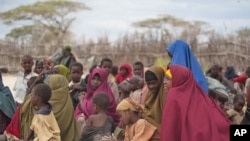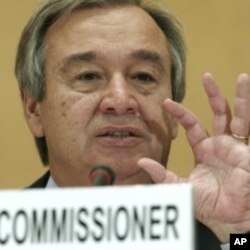The UN High Commissioner for Refugees, Antonio Guterres, warns extremism and insecurity will grow if the civil conflict in Somalia is not resolved.
On Friday, Guterres called on the international community to do more to find a political solution to this complex and dangerous problem at agency's annual conference in Geneva.
Most of the attention at his year’s conference was focused on the crisis in the Horn of Africa where hundreds of thousands of people have been fleeing from civil conflict and starvation brought on by the worst drought in 60 years.
Guterres said delegates concentrated particularly on the situation in Somalia, which he describes as the worst humanitarian and catastrophic situation presently in the world.
He noted there are 900,000 Somali refugees in four neighboring countries, pointing out that almost one third of them have arrived this year. Guterres said conflict and drought also have displaced about 1.5 million people inside Somalia itself. Indeed, he said, Somali refugees are everywhere.
“I would like to appeal to the international community, knowing that the neighboring countries will keep their borders open, to appeal to the international community wherever Somalis are for Somalis to be protected," said Guterres. "Unfortunately, in some situations the Somalis have been discriminated, they have been stigmatized. It is very important that protection is available for Somalis wherever they try to find safety.”
The High Commissioner also is appealing to Somalia’s warring parties to grant aid agencies access to people in need in south and central Somalia, regions which are controlled by Islamist Al-Shabab militants and off-limits to most UN and private agencies.
If people can be assisted back home, Guterres suggests fewer are likely to flee to other countries for help. This, he says would take some of the pressure off neighboring countries of asylum and also save the lives of people who probably will die while fleeing.
Humanitarian aid is only a temporary remedy, he said, adding that only a political solution will resolve this long, festering problem. Guterres said a recent agreement in the capital Mogadishu on the formation of a new, more stable government offers a so-called road map for a political solution.
“I think it is in everybody’s interest to be involved... if the Somali problem would not be solved, the impact of the Somali problem, not from the humanitarian point of view, but from the security point of view will have implications all over the region and probably all over the world," he said. "So, I think it is in the interest of the international community to invest in the solution of this problem.”
He also said the international community should nurture the political process that is now being born so it does not fail, as have all others in the past.





